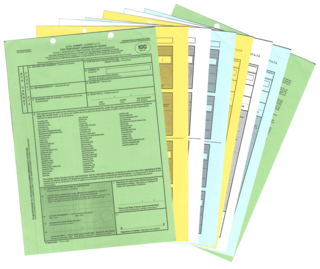Related Research Articles
Copyright is a type of intellectual property that gives its owner the exclusive right to make copies of a creative work, usually for a limited time. The creative work may be in a literary, artistic, educational, or musical form. Copyright is intended to protect the original expression of an idea in the form of a creative work, but not the idea itself. A copyright is subject to limitations based on public interest considerations, such as the fair use doctrine in the United States.

The Harrison Narcotics Tax Act was a United States federal law that regulated and taxed the production, importation, and distribution of opiates and coca products. The act was proposed by Representative Francis Burton Harrison of New York and was approved on December 17, 1914.

The Act Prohibiting Importation of Slaves of 1807 is a United States federal law that provided that no new slaves were permitted to be imported into the United States. It took effect on January 1, 1808, the earliest date permitted by the United States Constitution.

The Boerboel[ˈbuːrbul], is a large, mastiff-type dog from South Africa with a black mask and a short coat. This dog breed is large with a strong bone structure and well developed muscles. Its head appears blocky with a short length between the stop and nose. It carries itself with a confident and powerful movement, is fearless and shows courage when threatened.
A grey market or dark market refers to the trade of a commodity through distribution channels that are not authorized by the original manufacturer or trade mark proprietor. Grey market products are products traded outside the authorized manufacturer's channel.
The first-sale doctrine is an American legal concept that limits the rights of an intellectual property owner to control resale of products embodying its intellectual property. The doctrine enables the distribution chain of copyrighted products, library lending, giving, video rentals and secondary markets for copyrighted works. In trademark law, this same doctrine enables reselling of trademarked products after the trademark holder puts the products on the market. In the case of patented products, the doctrine allows resale of patented products without any control from the patent holder. The first sale doctrine does not apply to patented processes, which are instead governed by the patent exhaustion doctrine.

Japanese domestic market refers to Japan's home market for vehicles. For the importer, these terms refer to vehicles and parts designed to conform to Japanese regulations and to suit Japanese buyers. The term is abbreviated JDM.
A parallel import is a non-counterfeit product imported from another country without the permission of the intellectual property owner. Parallel imports are often referred to as grey product and are implicated in issues of international trade, and intellectual property.

John Baker Holroyd, 1st Earl of Sheffield was an English politician who came from a Yorkshire family, a branch of which had settled in the Kingdom of Ireland.
A bonded warehouse, or bond, is a building or other secured area in which dutiable goods may be stored, manipulated, or undergo manufacturing operations without payment of duty. It may be managed by the state or by private enterprise. In the latter case a customs bond must be posted with the government. This system is widely used in developed countries throughout the world.

Mitchell v MNR, [2001] 1 S.C.R. 911 is a leading Supreme Court of Canada decision on aboriginal rights under section 35(1) of the Constitution Act, 1982. The court held that Mitchell's claim to an aboriginal right to import goods across the Canada–US border was invalid as he was unable to present enough evidence showing that the importation was an integral part of the band's distinctive culture.

An import in the receiving country is an export from the sending country. Importation and exportation are the defining financial transactions of international trade.
An import license is a document issued by a national government authorizing the importation of certain goods into its territory. Import licenses are considered to be non-tariff barriers to trade when used as a way to discriminate against another country's goods in order to protect a domestic industry from foreign competition.

The ATA Carnet, often referred to as the "Passport for goods", is an international customs document that permits the tax-free and duty-free temporary export and import of nonperishable goods for up to one year. It consists of unified customs declaration forms which are prepared ready to use at every border crossing point. It is a globally accepted guarantee for customs duties and taxes which can replace security deposit required by each customs authority. It can be used in multiple countries in multiple trips up to its one-year validity. The acronym ATA is a combination of French and English terms "Admission Temporaire/Temporary Admission." The ATA carnet is now the document most widely used by the business community for international operations involving temporary admission of goods.
Since 2008 copyright in Afghanistan has been governed by the law on the support the right of authors, composers, artists and researchers.

A grant, in law, is a transfer of property, generally from a person or other entity giving the property to a person or entity receiving the property.

The Byrd Amendment—named for its author, Senator Harry F. Byrd Jr. of Virginia—was a 1971 amendment to the U.S. Federal Strategic and Critical Materials Stock Piling Act. It prohibited the US government from banning the importation of any strategic material from a non-communist country as long as the importation of the same materials from communist countries was also not prohibited. While it did not single out any particular country, it had the effect–intended by its sponsors–of creating an exception in the United States embargo of Rhodesia to enable the import of chromite ore from that country.
Omega S.A. v. Costco Wholesale Corp., 541 F.3d 982, was a case decided by the Ninth Circuit Court of Appeals that held that in copyright law, the first-sale doctrine does not act as a defense to claims of infringing distribution and importation for unauthorized sale of authentic, imported watches that bore a design registered in the Copyright Office. It carried no precedential weight, and is contrasted with Kirtsaeng v. John Wiley & Sons, Inc.
"Authorization" and "Secondary Infringement" are two instances of "indirect infringement" in Canadian Copyright law. In cases of indirect infringement, individuals can be held liable for infringement even where they did not personally make the copies of the copyrighted subject-matter. This expands the scope of liability. The Canadian courts have dealt with these concepts in a number of cases, several of which will be elaborated upon below.
Brown v. Maryland, 25 U.S. 419 (1827), was a significant United States Supreme Court case which interpreted the Import-Export and Commerce Clauses of the U.S. Constitution to prohibit discriminatory taxation by states against imported items after importation, rather than only at the time of importation. The state of Maryland passed a law requiring importers of foreign goods to obtain a license for selling their products. Brown was charged under this law and appealed. It was the first case in which the U.S. Supreme Court construed the Import-Export Clause. Chief Justice John Marshall delivered the opinion of the court, ruling that Maryland's statute violated the Import-Export and Commerce Clauses and the federal law was supreme. He alleged that the power of a state to tax goods did not apply if they remained in their "original package". A license tax on the importer was essentially the same as a tax on an import itself. Despite arguing the case for Maryland, future chief justice Roger Taney admitted that the case was correctly decided.